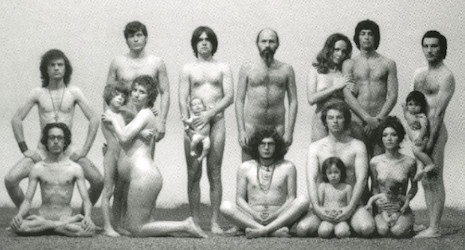
In 1970, Alejandro Jodorowsky brought his adaptation of Nietzsche’s Thus Spoke Zarathustra to the stage in Mexico City. A creation for its time and place, Jodorowsky’s Zarathustra was a play for four men (A, B, C, and Zarathustra) and two women (D and E), all (eventually) nude on a bare, white stage. The script indicated that the actors were to stand at the entrance of the theater and talk with the audience before the action began; Jodorowsky’s Zen master, the monk Ejo Takata, sat on stage meditating for the two-hour duration of the performance.
As the director recounts in The Spiritual Journey of Alejandro Jodorowsky, the staging of the production—called Zaratustra in Spanish—reflected his ongoing Zen practice:
My ambitions were becoming centered on the theater. Nevertheless, Ejo Takata’s teachings—to be instead of to seem, to live simply, to practice the teaching instead of merely reciting it, and knowing that the words we use to describe the world are not the world—had profoundly changed my vision of what theater should be. In my upcoming production, a theatrical version of Nietzsche’s Zarathustra, I had stripped the stage of its usual décor, including even curtains and ropes, and had the walls painted white. Defying censorship, the actors and actresses undressed completely on stage after reciting lines from the Gospel of Thomas: “The disciples asked him: ‘When will you be revealed, and when will we be able to see you?’ And Jesus said: ‘When you shed your clothing without shame, and when you take your jewels and cast them under your feet and trample them like little children, then will you be able to contemplate the Son of the Living One and have no more fear.’”
The production was a success, with full houses from Tuesday through Sunday. I then proposed to Ejo (without much hope) that he meditate before the public during the performance. To my astonishment, the master accepted. He arrived punctually, took his seat on the side of the stage, and meditated without moving for two hours. The contrast between the actors speaking their lines and the silent monk dressed in his ritual robes had a staggering effect. Zarathustra continued to run for a full year and a half.

Standing: Henry West, Brontis Jodorowsky, Héctor Bonilla, Micky Salas, Carlos Ancira, Isela Vega, Jorge Luke and Alvaro Carcaño. Sitting: Luis Urías, Valerie Jodorowsky (pregnant with Teo), Carlos (nicknamed “the hairy guy”), Alejandro Jodorowsky, Cristobal Jodorowsky and Susana Kamini.
So far as I know, you can’t watch a performance of Zarathustra on the web, but below, you can listen to the soundtrack LP recorded by the cast and the band Las Damas Chinas (Chinese Checkers), and if you open this link in another window, you can follow along in the script. Digital copies of the soundtrack are available from Paniques Records. It is, of course, entirely in Spanish, but that shouldn’t discourage anyone. These words from D’s song ring out in a universal tongue:
¡Mis piernas, mis dedos, mis pelos,
AAAmoor. . .!
Mi saliva, mi excremento, mi corazón. . .
(Translation: “My legs, my fingers, my hairs / Looove. . .! / My saliva, my shit, my heart . . .”)
While we’re on the subject of Alejandro Jodorowsky, don’t forget to give your money to the Indiegogo campaign for his upcoming feature Poesía Sin Fin (Endless Poetry). If you choose the “poetic money” perk, he’ll pay you back in bills of his own magical currency. Jodorowsky’s life and work are always cause for celebration.